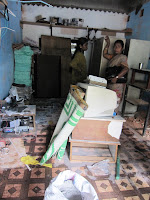22:23
30 July 2010
It poured three solid days, and when there were no more cats and dogs to rain, elephants and 
Each morning, everyone helps lug all of the booklets, tables, rugs and other junk out of the office space to the sidewalk so that construction can resume. During one storm, all of these items were left out unsheltered and are now moldy and nearly destroyed. Back and forth. Back and forth, we transport our little office.
Yesterday, I was sent out with Thomas and Purushothaman to a slum over an hour and one half by auto away from the office to complete a biometric survey. The ride resulted in all three of us becoming thoroughly soaked. By the time we reached the colony, our clothes were soppy, our hair drenched, and water trickled from the tips of our noses. It took all of our greatest efforts to protect the laptop and other electronic equipment from harm.
Arriving back at the office in the late afternoon brought no relief. Due to the never ending construction, we found all of the ladies huddled under a tarp that clearly wasn’t offering much protection. We sat in the rain for hours; there was nothing to do but wait to go home.
I think I made some social progress. With nothing to do but sit in the rain and wait, the Ladies and I took photos of each other. They all requested prints. It was great fun. We were also able to exchange questions about various lifestyles and customs in
One of the most prominent aspects of Indian adulthood is marriage, pre-arranged marriage. The common theme of “marrying for love” that in the 
At my current elderly age of 21 years, many of the ladies were disgusted that my parents weren’t searching for a husband; however, they were equally pleased to learn that I didn’t have a ‘boy friend’, which would suggest loose character. Most have some insight gained from American films that our social expectations and practices are dissimilar, and they all truly believe that
I’ve mentioned that most of the employees in my office are slum dwellers. Today, John sent me to a slum called Flower Garden with one of the Federation members, Subramani, who was also a resident of the colony. This was the first time that I was taken to one of my co-workers homes, and it proved to be a special experience.
First thing upon arriving, Subramani proudly ushered me into his beautiful two-room home and introduced me to
When Subramani and I returned from our visit to Flower Garden Slum, lunch was being served. As I approached the dinning circle, John immediately pulled me aside and suggested that perhaps I should go out to eat instead. He quickly explained that the meal was very spicy today (he was concerned for my frail American tongue). I shrugged my shoulders and politely assured him that spicy was nice.
I was crest-fallen to see that all of the girls had pushed away their plates of food without having taken more than a few bites. The men were huffing and puffing and trying to conceal their watering eyes while gulping down liters of water. Someone was fetching milk.
I was handed a plate, and all 30+ people present stared while I ate. Yes, it was spicy, but there are different types of heat. I despise when the capsaicin of a pepper lodges itself into the lips and tongue like microscopic razor blades that puncture the nerves and weaken the tear ducts; however, this burn was of a different sort. It licked the throat and lungs with delicate blue flames and warmed the body’s core. I felt like a healthy dragon ready to whistle fire. It was great, and probably one of my favorite meals since arriving in India. I’ll admit that it had a little ‘bite’, but nothing that would cause any discomfort.
After I finished, without watery eyes, a runny nose, or a sip of water, John laughed and sent me to go fetch chocolate bars to ease everyone else’s suffering. He had been worried about my contact with Indian spicy food since I’d arrived, but it proved to be an unnecessary precaution.





















